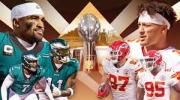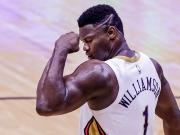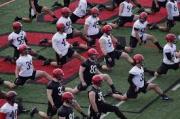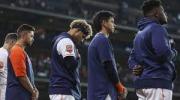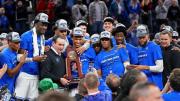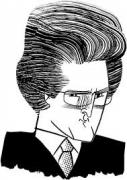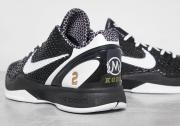Gene Therapy-The Flawed Logic of a Franchise QB
by Gene Clemons
In a world where we want everything right now, the NFL has chosen to go the opposite way when it comes to the quarterback position. Year after year we see teams reach on potential while disregarding production at that position. The rationale is always the same, “We need to find our franchise quarterback.” If we were to take an honest look around the league, how many teams can make the claim that they have their franchise quarterback for the next 10 years?
Of the 30 franchises there are only a handful of teams that can make the claim. The Bucs and Packers cannot despite having two of the best quarterbacks in the history of the game because there’s no way either of those guys play for another 10 years. Teams like the Chiefs, Chargers, Cardinals, Bengals, Bills and Ravens certainly feel like they have their guy for the next 10 seasons but the ever-increasing salaries of quarterbacks and the ever-looming threat of injury leaves questions about their long-term sustainability. Every other team is trying to figure it out. They either have a young quarterback they hope is the guy, a guy they believe (correctly or not) they may be able to upgrade from, or a guy they need to replace ASAP.
Then there’s the impatience of NFL fan bases and front offices. The more impatient the fan base, the more impatient the owner. After all the goal is to make money and a happy fan base is one that spends. What other type of fan base spends money? A hopeful one! So the NFL has become this revolving door of quarterbacks who fans hope are the franchise until they are not, and the team replaces them for the next hopeful. Organizations like the Broncos, Rams, Raiders, and Washington have been using this model for years to keep fans on the edge of their seats with their hands in their pockets trying to support whomever the new hope would be.
Outside of a few teams, coaches turn over every few seasons. So, most of the time they don’t outlive the proving ground for a potential franchise quarterback which also stunts the quarterback’s growth. Jameis Winston had 3 head coaches and four offensive coordinators in his five seasons with Tampa Bay before they decided to give up on him when Tom Brady chose the Bucs. Justin Herbert is going to throw more touchdowns this year in LA with a new coaching staff in just his second season but he’s also going to turn the ball over far more. These coaches are essentially being asked to groom a young quarterback for their replacement coach. I don’t think that is what former LA Chargers head coach Anthony Lynn had in mind when he decided to take their lumps with a rookie Herbert who compiled a lot of statistics but they didn’t equal wins. It begs the question that fans and coaches alike should ask regularly.
“Who cares if he’s the quarterback of the future; does he give me the best chance to win now?”
If this question was asked more often than a lot of fan bases would be happy because their team would be winning more. The coaches would not be worried about sacrificing wins for development which would lead to more job security. We would also really know who the best coaches were based on how they developed game plans to utilize the quarterbacks who gave them the best chance to win. Winning should be the great deodorizer but in the NFL a quarterback’s ability to be the “face of the franchise” seems to be just as important as their on-field ability. This is why players like Lamar Jackson and Jalen Hurts continue to be doubted as franchise quarterbacks while people still hold out hope for Sam Darnold and think Tayson Hill just needs a consistent opportunity to play the position to be successful. Jackson and to a lesser extent Hurts do not have the requisite look of a franchise QB. For others like Tyrod Taylor, Teddy Bridgewater, Baker Mayfield, Ryan Tannehill and Jacoby Brissett they don’t put up the flashy numbers that make fans swoon but when healthy, they can run an offense well and usually keep their team in a game. There’s value in those abilities as well and a ton of talented players like that in college who get overlooked for some project who has the look.
Two seasons ago quarterback Tyler Huntley was a Pac-12 first team selection in his senior season. He was named a third team All American. Yet when the 2020 draft rolled around he was not invited to the combine and was not selected in the draft. He had to sit and watch a quarterback he outplayed in the Pac-12 (Herbert) go top 10 and a bunch of other names that he undoubtedly never heard of be drafted while he waited for an undrafted free agent offer from Baltimore who already had three quarterbacks on the roster. In the three games where he has received significant playing time, he has performed like a starting quarterback in the NFL but this offseason, even if another team brings him in, you will hear people say things like they say about Hurts, “He’s capable but the team still needs to draft a franchise quarterback.”
So much draft capital has been wasted on quarterbacks who are not playing. In San Francisco the 49ers have a championship caliber team. They have a quarterback who is a liability in the biggest moments. Instead of upgrading the position this season, they decided to take a quarterback in Trey Lance that they have no intention of playing. They could have used that top five draft pick to bring in other talent that could make life easier on the quarterback that they chose to stick with. They were knocking on the door just a few years ago and Garropolo was the reason they did not bring home the trophy. So why not bring in someone who could possibly take him out of the equation either because you don’t need much from him or you have upgraded from him. It feels like it has already come back to bite them. Especially with how tight the playoff race is this season in the NFC.
Is a franchise quarterback, a franchise quarterback if he is not winning games? What about if he is not playing? Do statistics make a player a franchise quarterback? Or should the attributes that make a quarterback “franchise” worthy be based on how they fit within the framework of a particular team’s scheme? Philadelphia or Baltimore may not break any passing records, but they sure do seem difficult to beat when Hurts and Jackson are behind center. Both teams were also smart enough to put backups in place that allowed them the chance to have success even if the starter is out. That’s proper planning. Because not every team gets lucky enough to get Patrick Mahomes, Aaron Rodgers, Russell Wilson and Tom Brady. The rest just need to focus on winning games the best way possible.
###
Gene Clemons is a Sports Analyst and Contributor to CWN Sports. His weekly column and podcast - Gene Therapy focuses on Sports, Politics and Social/Urban issues.
Read more



